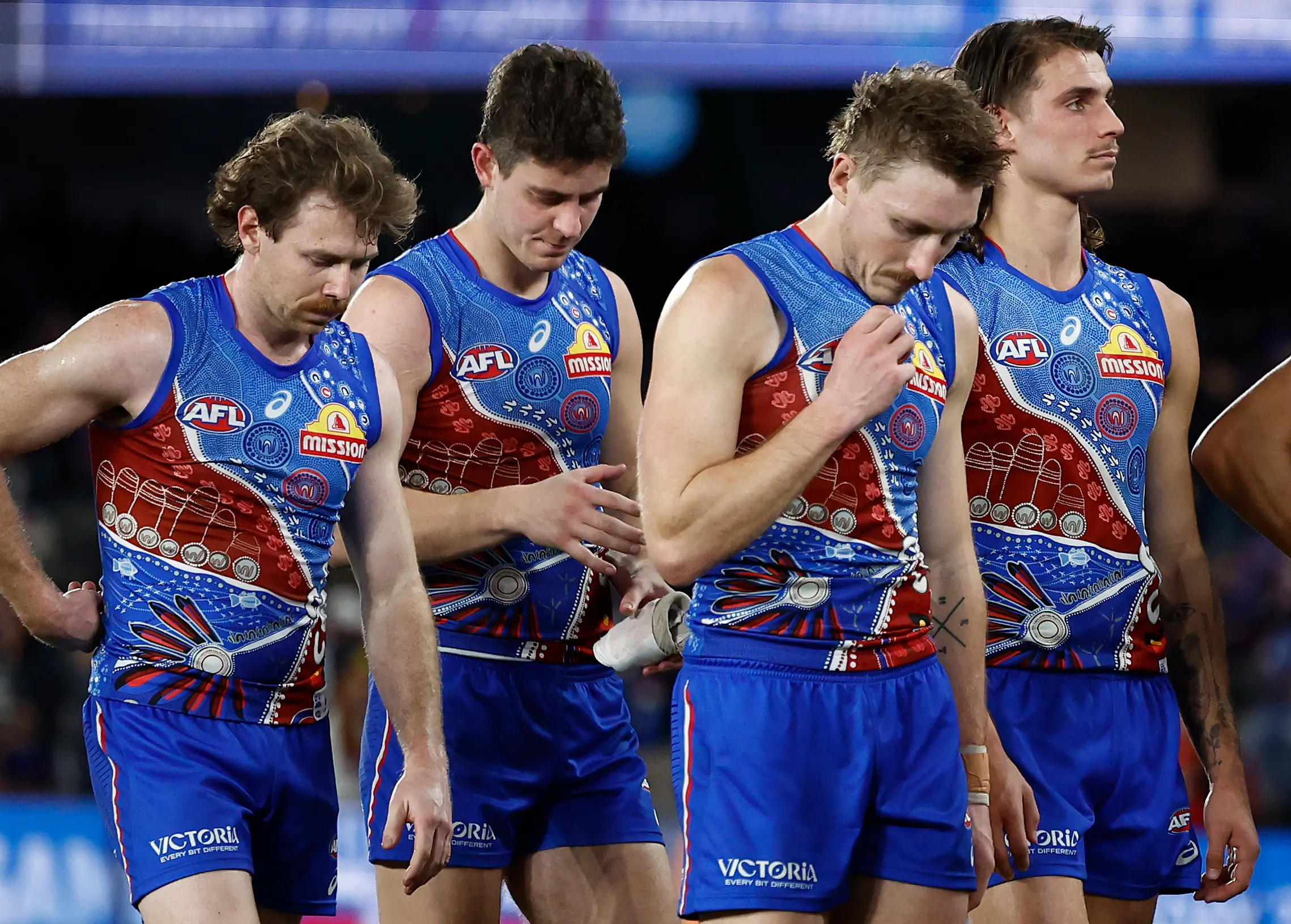At the conclusion of Round 18, Luke Beveridge's Western Bulldogs again find themselves on the outside looking in.
Pundits still expect the Footscray natives to, as is their custom under Beveridge, chart a course to September action. However, it is the lack of value placed in defence that will again prevent the Dogs from finishing in the top four - a feat that continues to elude the premiership coach.
Only twice in Beveridge's storied tenure has his side finished inside the top four for points against, and in no small coincidence, the Bulldogs have made the grand final in both seasons. In a season where the Dogs are 1-7 against top eight sides, with a daunting trip to Brisbane threatening to worsen that abysmal record, Beveridge's men currently rank 10th in that metric.
More damning still, the Dogs are 13th for points against, against the top eight, conceding some 28 points more per game than their next opponent Brisbane, who rank 1st. Of the nine sides acknowledged as being finals contenders, Fremantle are next worst than the Western Bulldogs, but even then, they're conceding almost three goals fewer per game against the top eight.
Given the breadth of elite talent the Bulldogs boast, particularly in the engine room, and forward of the ball, it is their defensive stocks that have come under the microscope of late. While the acquisition of high end talent for their back 50 must be a focus moving forward, the composition of the back line currently taking the field must be questioned.

Beveridge has continually opted for a small, nimble back line. The offensive production that comes with this choice is excellent, with the Dogs ranking fifth in the league for points scored from chains starting in the defensive half, but what this allows other sides to do against them is worrying.
The Bulldogs have conceded the most bags of five or more goals to an opposition forward this season, allowing this to happen eight times - two more times than last-placed West Coast have allowed. The six goals given up to a rampant Riley Thilthorpe in the Bulldogs' last outing illustrate perfectly the struggles Beveridge's men have defending bigger bodies, with Eric Hipwood, Jeremy Cameron and Nick Larkey a few of the other names who have collected a handful against the Dogs.
Distributors Bailey Dale, Bailey Williams and Lachie Bramble have each played all 17 games for the Dogs this season, and Jason Johannisen has played 10 games, after overcoming injury early in the season, and illness, more recently. Former Saint Nick Coffield has played the last four matches of the campaign after strong VFL form. That is too many like-types on the park at once, especially when those occupying the key posts, in Rory Lobb (17 games) and James O'Donnell (16 games) are of slender builds, compared to their contemporaries.
The Bulldogs rank last in the AFL for defensive one-on-one win percentage, losing more than 35% of these contests. A deep September run for the Bulldogs hinges on Beveridge making changes.
The recall of Liam Jones looms as one such change. The 204-gamer was last sighted in a Round 6 rout of St Kilda, with Beveridge yet to recall the experienced tall.
"The fundamentals of his game and the essentials that he brings forth that fuel a presence, and even his key-back intercept game, just haven't quite been there for us at the start of this year,” Beveridge said at the time, preferencing the then-untried Jedd Busslinger for their Round 7 clash with the Giants.
Busslinger and Jones boast similar strengths, although Jones' have been exhibited more often at the highest level, leading some to have him in potential All-Australian conversations in 2023.
Jones possesses strong marking ability, in contested and intercepting situations, safe and effective ball use (80%+ disposal efficiency across his time at the Kennel), and a big frame, standing just under two metres tall.

Busslinger is of a similar height, is a known accumulator, and uses the ball well. He averages just under 25 disposals a game at VFL level in 2025, and also goes at over 80% disposal efficiency. The East Perth product changes angles by foot confidently, is strong above his head, and has displayed a defensive IQ beyond his years, across his lengthy reserves apprenticeship.
The early-season VFL form that culminated in his debut showcases these strengths perfectly, with standout performances against Werribee in Round 3 and Sandringham in Round 4, franking his credentials.
A return to the senior side for either commodity would appease concern regarding the size of the Bulldogs' backline, and likely yield smaller scores against. At the very least, these men promise to improve the side's league-worst defensive one-on-one rating.
Defence is not solely the responsibility of a given side's backline, and help from further up the field is imperative. Beveridge has gone to great lengths to explain that pressure from the 'front 12' makes life easier for his under-siege defence.
The relative inexperience of his side (nine players had less than 50 games of experience against Adelaide) may explain a penchant for ineffective team defence, but that excuses Beveridge for failing to instil transition defence as a priority. The Bulldogs concede more than the AFL average for points from defensive half per game. This is damning, after more than a decade in charge, with the list at his disposal.
Can Beveridge make the necessary adjustments, both in personnel and game plan, to drive this club to the ultimate success? With another two seasons recently added to his tenure, the time for change has well and truly arrived for this combative coach.






